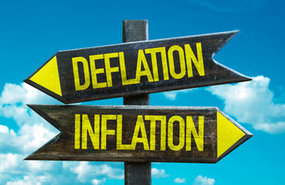Inflation & Deflation – Basics & Effects

Inflation and deflation are two most common economic terms that we often hear or read across channels such as television, radio, social media, and others. However not many people know exactly what they mean and what effects they have on the economy.
This article is an effort for everyone wanting to understand these two economic terms i.e. inflation and deflation.
Inflation – Definition & Consequences
The word inflation comes from the Latin “inflare” and means to inflate, to expand or to extend.
In economics, it actually refers to the money supply. This means that more and more money is added within a monetary system or in the overall system. Inflation is often equated with price increases or loss of purchasing power.
This means that if, for example, the economy grows by three percent, but the money supply (mostly by the banks) is increased by four percent, this inevitably leads to price increases. Why?
As a result of the expansion, there is more money in circulation than is actually needed for the entire consumption of goods and services. This means that prices will have to rise. Price increases results in higher living costs and are therefore a loss of purchasing power.
Put simply, this means that the same amount of money will be worth less tomorrow than it is today. This means that we can afford less. After all, our incomes are rarely adjusted to inflation and increased!
Whether monetary policy is more likely to promote inflation or more likely to deflate can be determined quite simply on the basis of the following:
Monetary growth divided by economic growth
- If above ratio is greater than 1, then loss of purchasing power due to price increases.
- If above ratio is less than 1, then price fall (deflation and economic collapse).
More money means deflation will be good for you, because your money will be worth more. While inflation will be bad because your money will lose value.
Deflation – Definition and Effects
Deflation is the opposite of inflation. Deflation causes prices to fall. They fall because the money supply is smaller than necessary for the consumption of all goods and services. In order to restore equilibrium here, too, prices must be lowered. The cost of living falls and life as a whole is becoming cheaper!
There are different views on the consequences which cover a whole range from extremely positive to completely negative. On one hand the economy could be heated up by falling prices. As everything becomes cheaper, people consume more and this leads to economic growth.
On the other hand, there may also be a deflationary shock as people speculate that prices will be cheaper later than they are today. In this case they consume less. This leads to a reduction in sales and job loss i.e. economic output falls.
The effects of deflation is mainly on consumption, because individuals delay their purchasing decisions. But corporate profits drop and unemployment rate increases.
End Note
Both inflation and de-inflation can be the result of changes in the supply and demand of products or services or monetary policy through their decisions on intervention interest rates, but it is normal for central banks to try to maintain price stability at all times by avoiding that both are excessive and bringing their rates closer to their objective.
Author Bio:
Hi, I am Nikesh Mehta owner and writer of this site.
 I’m an analytics professional and also love writing on finance and related industry. I’ve done online course in Financial Markets and Investment Strategy from Indian School of Business.
I’m an analytics professional and also love writing on finance and related industry. I’ve done online course in Financial Markets and Investment Strategy from Indian School of Business.
I can be reached at nikeshmehta@allonmoney.com. You may also visit my LinkedIn profile.



